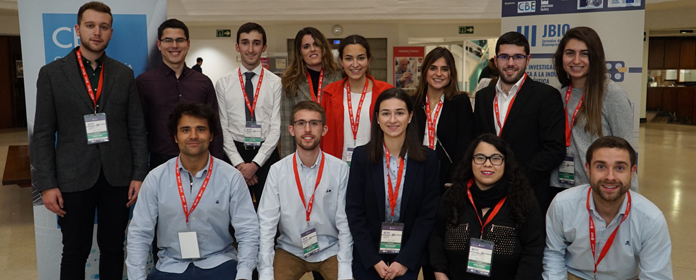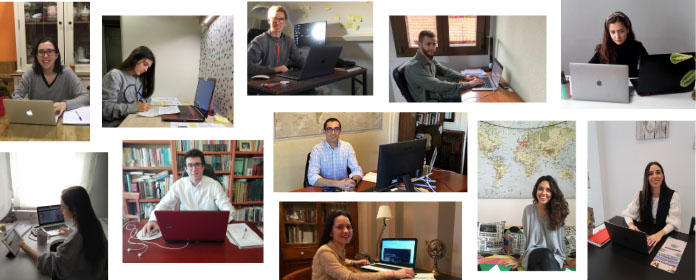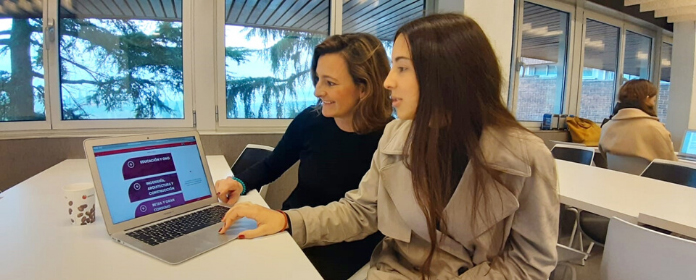"Dr Ana Patiño made it very clear to us: the first thing is the team and then the support when it comes to entrepreneurship in the biosanitary sector".
Luisa Chocarro (Biochemistry 18 and student of Master's Degree MIDI) is the co-director of the Biotechnology Club and business of the University and was involved in the organization of the III Bioentrepreneurship conference .

PHOTO: David Doménech
While studying the Master's Degree in research, development and Drug Innovation (MIDI) of the School of Pharmacy and Nutrition, Luisa Chocarro (Biochemistry 18) co-directs the Biotechnology Club and business: a group of 13 students of Degree, postgraduate program and doctorate who meet to share their interest in entrepreneurship in the biosanitary sector and, in addition, for 3 years they have been organizing the III conference of Bioentrepreneurship. Some conference with experts and entrepreneurs which this year was attended by more than 300 students, teachers, researchers and other professionals.
For Luisa, in addition to learning how to manage an event, her participation in these meetings was marked by testimonials such as those of Dr. Patiño and bio-entrepreneur Eduardo Bravo.
- What do you consider that your partnership in the Biotechnology Club and business are giving you during the Master's Degree MIDI ?
I chose to study the MIDI because I wanted to have a broad vision of the employment opportunities offered by the pharmaceutical industry, from the preclinical research to the commercialization of the drug. The Club is aimed at students who want to focus their professional future on innovation and the application of scientific knowledge to the business world. Therefore, being part of the Club is a complement to Master's Degree in terms of deepening their knowledge of possible professional careers within the pharmaceutical and biotechnology industry. However, while the goal of the Club is to learn from the testimonies and experiences of other professionals in these sectors, the purpose of the Master's Degree is to train ourselves professionally to be able to work in the areas covered by the world of the business pharmaceutical industry.
- What do you think you have learned in the organization of the III University of Navarra Bioentrepreneurship conference ?
In addition to the theoretical and practical knowledge of the conference, what I would highlight is the work of management behind it. The skills of work teamwork, communication, search for sponsorship and collaborations, management of time and available resources and the resolution of unforeseen events oriented to results is what I take with me as the greatest learning. It should be noted that in order to develop these skills I have been very fortunate to have the financial aid and enormous support of Eduardo Camina, (co-director of the Club) and the rest of the fellow students of the Club, as well as Innovation Factory, for the organization of the conference, and the Schools of the area biosanitary of the University of Navarra.
- Of all the speakers, which "motivating" experience and teaching internship of those who spoke would you choose?
I found it motivating to listen to the speakers, all of them great professionals: Ana Patiño -Professor of Genetics in Pediatrics at CUN-; Jesús Ruiz-Cabello -Ikerbasque Research Professor at the CIC biomaGUNE-; Francisco J.Aranda -director of Quality and Regulatory Affairs of CINFA; and Eduardo Bravo -CEO of Nordic Nanovector-, who told us about their path staff of bio-entrepreneurship and their professional path, without forgetting that one day they were in our place, which facilitated a close meeting in which the attendees could reflect on their professional future and solve their doubts.
I would also like to highlight the enthusiasm and motivation that Ana Patiño transmitted from her research vision for innovation and bioentrepreneurship. I remember that she told us "Be clear about goal, the strategy and the price is fundamental. The most important thing is the team; the second most important thing is the support". Also the strength and frankness of Eduardo Bravo, who encouraged attendees to seek excellence in the work: "Speak English, write well, present well and be good with numbers. Plan your life and take opportunities. You never know where life is going to take you".
- How do you value the training that, also within MIDI, is offered through activities such as the MIDI meetings? Do you think they help you to get in contact with the pharmaceutical business world?
I consider MIDI to be a very good Master's Degree that covers all the areas that affect the world of medicine and that prepares us to work in the pharmaceutical business , both in research and in management of scientifically based projects. The dynamics of the activities of Master's Degree, both classes, practices, work in group, seminars and meetings, allows us to listen and talk to professionals in the different areas that affect the world of medicine, and thus know their professional specialization program more in detail, at the same time that the different subjects are taught.
- Finally, what are your plans when you finish Master's Degree?
There is still a long way to go to Master's Degree, since at the moment I still have to finish the theoretical part of Master's Degree (until June) and do the work End of Master's Degree (from June to December), but when I finish Master's Degree I would like to specialize in the research of drugs. I am very interested in development of drugs in cancer.




